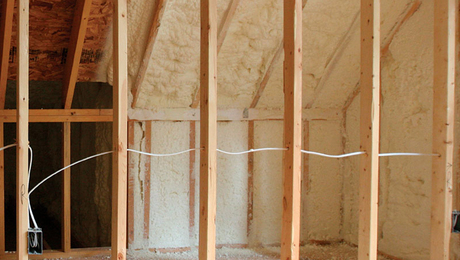One hot afternoon this summer, I looked at an old friend for the last time, his head pillowed on the white fabric of his casket, his familiar glasses perched on his owlish nose. Despite the fact he’d lived to 85, and that there was nothing remotely tragic about his death, tears I could not stop welled out.
I met Werner in September, 1982. I’d quietly dropped out of Rutgers University that spring, reeling with negativity. I’d hated every minute there, hated the 9 to 5 suit and tie job and vinyl sided house in some anonymous New Jersey suburb that it was preparing me for.
All of my high school friends were in college or the military. The oldest of them had graduated from Rutgers that spring, landing a lucrative job writing software, whatever that was. I worked for his father that summer, scraping paint off an Italianate Victorian, working from a 40 ft. wooden ladder with a missing rung. Chips of lead paint stuck to my sweaty arms and in my nascent beard. My snot was white with paint dust.
For $600, I bought a rusting, 1973 Chevy 3/4 ton pickup with no bed, a 350 V-8, and a leaky 4 barrel carburetor. Armed with enthusiasm and ignorance about what I didn’t know, I rebuilt the carb and built a wooden bed on the truck. This beat anything I’d done in college. I stayed out most nights, drinking too much cheap beer and sleeping in a hayfield on a buddy’s farm in the truck bed I’d built. When the sun rose, I’d bathe in the farm’s pond, washing with Ivory soap (It floats!), and swimming through the swirls of mist. Then I’d go scrape lead paint, and if she was around, flirt with my boss’s daughter.
My mother worried.
It wasn’t a bad life, but I knew it wasn’t sustainable. There was something else I knew, something I’d mostly kept to myself. I wanted to be a carpenter. I just didn’t know how to do it, or even how to say it. Whenever I had mentioned it, my mother, teachers, guidance counselors, and peers all dismissed the idea.
“You’re too smart to be a carpenter.”
“Don’t waste yourself like that.”
“You should be a lawyer.”
“How will you afford a family?”
Facing down that prejudice was more than I’d been able to do. Even my boss, whose house’s lead-paint carapace I was removing and who made a good living as a plumber and electrician, told me to go back to college.
But I just couldn’t bring myself to do that. It was as if there was a carpenter inside me who simply had to come out. It was almost a physical sensation. I was as square a peg as ever tried to fit in the State University of New Jersey.
I had hedged about going back to college, not wanting to face the disapproval that would come with not returning. I’d been able to avoid the issue by calling the paint scraping a summer job, but at the end of August when my friends left their summer jobs and went back to college, I couldn’t fake any longer. I started looking at the want ads. One caught my eye – Woodworker wanted.
I called the number, which turned out to be for Warren Lumber, a local yard. The person who answered said to come in, drive ’round to the door shop in the back, and ask for Werner. I knocked off scraping paint a little early and went to the door shop. I was greeted by a middle-aged man with a German accent. Werner. He wasn’t friendly or unfriendly, just proper and businesslike. I felt he looked at me disapprovingly, but to this day I don’t know if that was rooted in my own insecurity or in his honest reaction to my unkempt hair, scraggly beard, and paint-chip covered clothes. Later on, I figured out that Werner’s high standards had led him to be cautious with new guys. A lot didn’t last.
Werner wasn’t looking for much – Someone who could read an order, miter casing legs on a radial arm saw, and accurately assemble trim packages for delivery. He had me read a tape measure and add together a couple of fractions, then sent me on my way with no sense of whether I had a shot at the job.
In the end, I got the job. In the three years I worked there, Werner taught me enough that I advanced to running the warehouse and operating the small custom-order section of the shop. Werner became my friend and mentor as well as my boss. And what a mentor! He’d apprenticed as a cabinet-maker in a traditional shop in Germany, then been drafted into the Wehrmacht in January, 1945. You can guess that ended badly. After surviving 4 years as a POW in a Soviet gulag, Werner made his way to the States, where he became a trim carpenter in the post-war housing boom, eventually moving inside to run the door shop.
When I figured I’d learned enough at the door shop to go out on my own, he remained a resource who helped me figure out the huge amount I didn’t know. And when Werner eventually retired, he even worked for me on occasion, keeping his hand in the game.
More than anyone, Werner taught me to be a carpenter. But more importantly, Werner confirmed that there is dignity and honor in working with one’s hands. Here was a man who’d quite literally been through hell, and who then came to a country whose language he didn’t speak where he made a good life. Werner married a wonderful woman and raised a fine family, all the while sweating and bleeding and freezing on construction sites. To me, as important as it was to learn how to get a tight miter and to hang a door, it was even more important how Werner validated my own vision. I couldn’t imagine how anyone could look at his life and say he’d wasted it by becoming a carpenter.
Werner gave me courage to become who I am. I’m not sure I’ve ever received a more important gift.
Fine Homebuilding Recommended Products
Fine Homebuilding receives a commission for items purchased through links on this site, including Amazon Associates and other affiliate advertising programs.

8067 All-Weather Flashing Tape

Affordable IR Camera

Handy Heat Gun



























View Comments
This is a good story. RIP Werner.
Thank you for this wonderful memorial to my father. I hope you know that he was proud that you started your career with him, but more importantly he was proud to call you his friend.
Thank you, NPershyn. We were lucky to have known him.
This is such a lovely way to pay your respects to your mentor.Such stories inspire us to follow our heart and do what we love.And such great teachers are needed.The only thing we can do is teach and guide someone else and return the favor.
It is wonderful to look back on those old guys who made an impression on our youth and guided us, without knowing, down the road of life. Great story, maybe you should be a writer.
Andy - as always with you, wonderfully written...but better yet, a beautiful homage to the importance of the influence of your friend. Well done and thanks for sharing this. Ron
Andy, your story really "rings true" with me because I really wanted to be something other than a liberal arts college student all those years ago. I really like working with my hands. We should all tell children, "be what you really want to be in life."
Well said about your friend. Following your chosen career should never be a story of apology nor should anyone be ashamed of working with their hands. You were blessed to know and learn from him.
Your story was wonderful. I faced many of the same obstacles in my journey. Some part of me always wanted to ba a carpenter as well. My condolences to the loss of your friend and mentor.
Sorry to hear that you have list such a awesome person in your life . I need some advice .. I have always wanted to be a carpenter ! I get allot of discouragement from everyone I know because I am a woman . Is there any women Carpenters ? Does that even exist ?! I really need an answer .. I need a career .. I'm only 20 years old .. working 2 part time shitty jobs and I'm ready for a big change . If you could get back to me with some advice that would be truly appreciated .. -Sage Nelson
*Lost
Sage Nelson, there are indeed female carpenters, although they are in the minority. Honestly, the building trades tend to be conservative and you will likely face some resistance. The best way to overcome that is to earn respect by becoming good at the job and being willing to work hard. I know a few carpenters, some of them very good, who learned in trade school. That can be a great way to pick up the skills, and may be an easier entry into the field than the more common method of starting out as a construction laborer and working your way up. On the other hand, starting as a laborer or carpenter's helper will immediately help to pay the bills.
Good luck, and don't get discouraged. Feel free to contact at the magazine if you'd like. aengel@taunton.com
Andy, great story. I realize this is an old post yet I felt the need to revive it because it is so relevant. I went to school and got a degree while also working with a carpenter, and then working with a friend for 5 years who started his own construction business.
That same friend is now probably the most successful person I know. (He now works exclusively on $3, 4, 5 million+ homes on the 'Gold Coast' in Long Island, NY, and has made a *very* nice living for himself.)
In my opinion the integrity of doing quality work and seeing tangible results is unmatched anywhere in the corporate world.
My question is on your opinion of doing carpentry/physical work after age 40, 50 and beyond. I now realize that when I was younger (early 20's), doing carpentry 5 days per week kept me in the best shape of my life. I have since trained for hours at the gym and in martial arts, and I now realize that there is no better all around workout than this type of work.
What are your thoughts on taking care of the body long term while doing this type of work? (I haven't been doing this kind of work steadily for 20 years. I'm wondering if it is just a matter of getting back into shape for it, or if there is some major change in the body's ability to do it in reasonable health after age 40.)
Thank you!
Great Story. This story inspires us to follow our heart